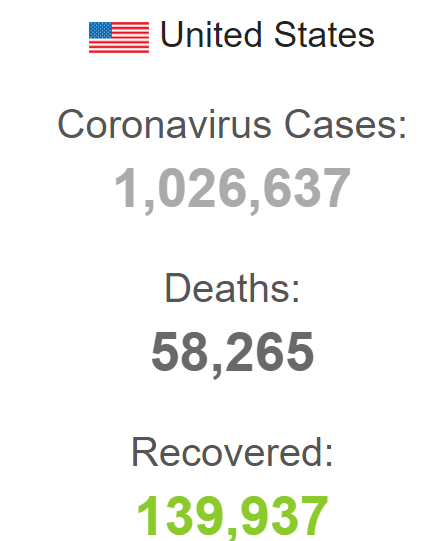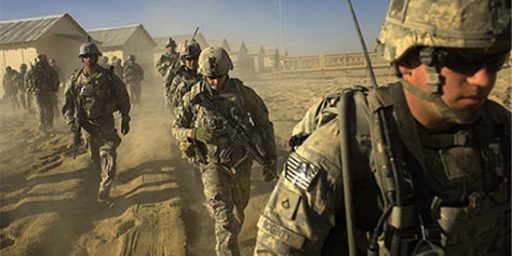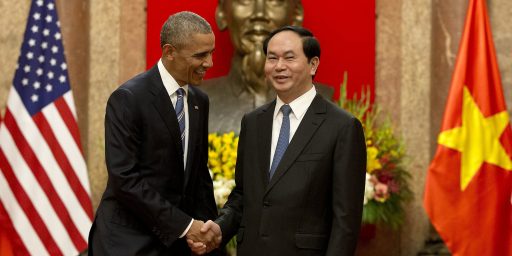COVID-19 Has Killed More Americans Than Vietnam War
Another grim milestone. It won't be the last.
The United States had military forces in Vietnam from 1954 to 1975, with a peak of 536,100 deployed in 1968. We lost 40,934 troops to combat and 58,220 from all causes during that period. We’ve now lost more to the novel coronavirus in just three months.

The 58,220 figure from Vietnam counts everything from off-duty vehicle accidents to suicides. The 58,265 from COVID-19 counts only confirmed cases from those who were diagnosed with the disease. The first is an overcount; the latter, an undercount.




A month ago today, we had just over 2,000 deaths. We’ve lost 56,000 in that month.
Grim, indeed.
It’s worth noting, for those who may not understand the significance, that Americans saw Vietnam as a national calamity. We swore never to sacrifice young American men and women to ill-conceived, mismanaged wars. “The Vietnam Syndrome” had a profound effect, until the invasion of Afghanistan, on the conduct of American foreign policy generally, given the political restrictions and general reluctance to use force unless there was a clear, achievable objective (see the Weinberger/Powell doctrine). Of course, the 9/11 attacks, Afghanistan and Iraq blew that caution all to hell, but for a long time, we looked at the 55,000 names on the Vietnam Memorial and said, “Let’s not do that again.”
I wonder what, when the current crisis is over, the comparable “Pandemic Syndrome” will be, and how long that set of understandings will last.
@Kingdaddy: On the recent Biden/Reade thread, you talked about how either way, someone’s getting damned…this situation looks very similar…all the evidence seems to point to the fact that so many of the horrible results of this pandemic, particularly the number of deaths, could have been avoided had this administration handled things differently…so who gets damned, the president, his enablers, or both…
@Kingdaddy:
I don’t like saying this, but what people will remember most about this pandemic is the effects on the economy.
Rationally, this should mean next time, and there will be a next time, extreme measures should be taken at the first sign of a contagious disease with a high mortality rate. This would be the best we can hope for.
Realistically, I fear there will be a determination to take less effective measures, like maskas and hand sanitizer, with some remote work, because a falling economy(*) is worse than a few hundred thousand deaths.
(*) Taking radical measures early means they will be required for a shorter time, but try explaining long-term thinking to people obsessed with the next quarterly report and nothing else.
60,000 deaths and 140,000 recovered is a 30% death rate.
I’m going to hope there’s a long window on how long after infection has cleared before we say someone has recovered.
What strikes me the most is the time frame. Perhaps it’s the perception for some (not all of course) that time seems to have slowed down. But that doesn’t really explain how so many administration supporters seem to shrug off the number of deaths in such a short time span. It’s what I think every time trump or one of his people try to compare numbers for annual flu, car accidents, H1N1 or anything else — all of those numbers are for much longer time periods.
If 60K people died of anything in a little under 3 months, in any other circumstances, the entire country would demand change. But one difference here is that the people who are taking this seriously are staying home or risking their lives. The ones who want to go back out into the streets are people who think they are risking nothing by advocating that. And it attracts media attention. The everyday people who take this seriously have to rely on polling or surrogates to advocate for them. There’s no place — even in social media — for all of them to come together and demand for policy makers to do the right thing.
Today in Arizona, I waited anxiously to find out if our governor had been persuaded by the lunatics to reopen the state. Fortunately, he extended the lock down (with some easing) for a couple of more weeks.